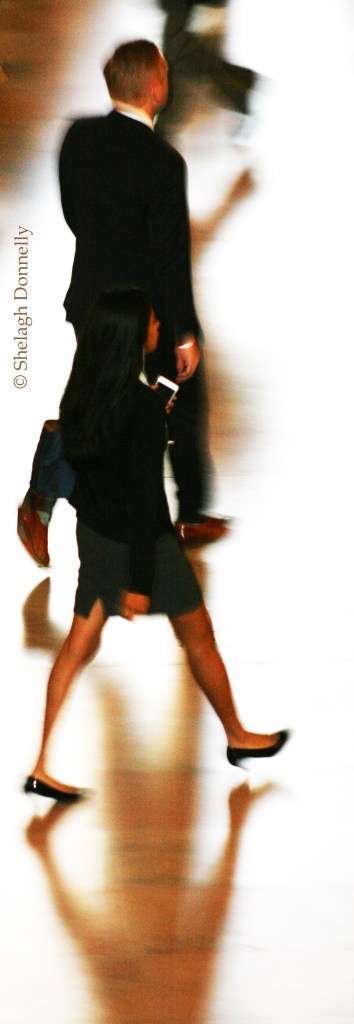 Your next interview may not be a walk in the park, but you can make a good impression by standing tall and injecting warmth and confidence in your body language.
Your next interview may not be a walk in the park, but you can make a good impression by standing tall and injecting warmth and confidence in your body language.
Some of us are comfortable heading into an interview, be it with a five-person interview panel or a CEO. Other assistants view job interviews as among the most daunting forms of torture.
Think about it: economic downswings and recovery aside, assistants have typically, in the past, enjoyed relative stability of employment. Now, whether by personal choice or circumstance, some career assistants have joined the ranks of new graduates who – having invested significant time and monies in securing their credentials – are understandably keen to launch their career.
Having served on more than a few interview panels and selection committees, I speak from experience. The people across the table during your interview do want to assess your skills, experience, education and fit for the job. Most interviewers don’t intend to discombobulate candidates. Keep in mind, though, the managers and executives involved in the recruitment process are typically busy people.
Panel members’ priority is to get the recruitment process right the first time
When an interviewer sees a candidate gulping for air, then, as s/he enters the interview room, clutching the arms of a chair, or over-eagerly nodding in agreement with almost anything anyone says, s/he’ll likely be empathetic. The pragmatic interviewer, though, will also consider whether a candidate who is unnerved by an interview process can cut it in a demanding office environment.
With this in mind, it’s wise to approach a job interview with heightened consciousness of how we present ourselves.
Balance interview preparedness with ability to articulate how your skills, education, experience and personality make for a good fit
That’s not all, though; we need to develop and remember to ask insightful questions that cinch the interview … and do all this along with elevated awareness of our body language. All this, of course, while feeling both hopeful and vulnerable. A walk in the park, yes?
Stand (and sit) tall, convey confidence, make eye contact, and engage with others in the room
The good news is that the simple virtue of this heightened self-awareness, managed correctly, can make us that much stronger a candidate. Here, then, are some mantras for your next job interview. Filter them for your situation and culture, and practice these elements of your interview just as you do prospective questions.
- Stand tall – and keep your arms relaxed when entering the room. I know someone who is barely 4’11″/almost 150 cm tall, but manages to stand taller than many people who have six inches/15 cm on her in height; it’s all in her attitude.
- Relaxed entry – Keep your walking pace natural, neither sprinting nor hesitating as you make your way into the room
- Confident handshake – You want to achieve a happy medium, somewhere between a vice grip and a tentative hand
- Eye contact – Many of my readers will want to maintain eye contact, particularly when shaking hands and when responding to interview questions. When responding to a question, remember that you’re conveying information to the group at large; don’t limit your eye contact solely to the individual who asked the question at hand.
- Relaxed, but not overly so – Poised is the effect we’re going for; check yourself if you find yourself crossing your arms over your chest; pay attention to your posture and sit tall; do not slouch (“… and eat your vegetables!”)
- Lean in – You’ve heard lots about this recently, and it’s appropriate in this context; just don’t lean in to someone’s personal space or, conversely, slouch back in your chair
- Arms – Where are your arms, and why is it suddenly so tempting to cross them in front of your chest? Where do they go, then? Well, you don’t want to emulate someone standing in front of dozens of airline passengers, signalling directions to exits and the facilities. Nor do people appreciate waving or chopping motions accompanying anecdotes of how you successfully diffused a difficult situation. Even fewer enjoy having a finger waggled in their face. We’re aiming, remember, for a poised and relaxed presence, even if that’s not how you feel.
- No bobble-heads at the table – While an affirmative nod of the head here and there is perfectly appropriate, you want to pace yourself in this respect. Too much of this, and you may present as being overly eager to signal agreement no matter what someone may say.
If you’re a recent grad, or haven’t interviewed in some time, the entire job search process may be daunting. By recognising and paying attention to your body language alongside the other elements of your interview preparation, you’re increasing the potential that this next interview may be the one that secures you the job offer you’ve been seeking.
Thanks for the reminders. It’s been a while since my last interview.
You’re most welcome, Cheryl, and good point. It’s easy to lose sight of some practices when you’ve not been interviewed for a while.